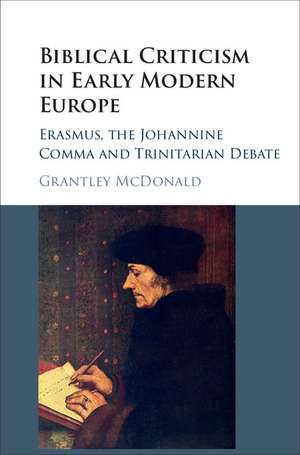Biblical Criticism in Early Modern Europe: Erasmus, the Johannine Comma and Trinitarian Debate
Autor Grantley McDonalden Limba Engleză Hardback – 26 iul 2016
Preț: 640.13 lei
Preț vechi: 833.84 lei
-23% Nou
Puncte Express: 960
Preț estimativ în valută:
122.49€ • 130.98$ • 102.13£
122.49€ • 130.98$ • 102.13£
Carte indisponibilă temporar
Doresc să fiu notificat când acest titlu va fi disponibil:
Se trimite...
Preluare comenzi: 021 569.72.76
Specificații
ISBN-13: 9781107125360
ISBN-10: 1107125367
Pagini: 400
Ilustrații: 9 b/w illus.
Dimensiuni: 158 x 235 x 25 mm
Greutate: 0.68 kg
Editura: Cambridge University Press
Colecția Cambridge University Press
Locul publicării:New York, United States
ISBN-10: 1107125367
Pagini: 400
Ilustrații: 9 b/w illus.
Dimensiuni: 158 x 235 x 25 mm
Greutate: 0.68 kg
Editura: Cambridge University Press
Colecția Cambridge University Press
Locul publicării:New York, United States
Cuprins
Introduction: the birth of the Trinity; 1. Erasmus; 2. The Johannine comma in sixteenth-century bibles after Erasmus; 3. Raising the ghost of Arius: the Johannine comma and Trinitarian debate; 4. From Civil War to Enlightenment; 5. The Johannine comma in the long nineteenth century.
Recenzii
'What this book superbly demonstrates is that the relation between philology and theology is by no means straightforward, and that there was by no means a clash between philology and theology.' Dirk van Mierr, Renaissance Quarterly
'… Biblical Criticism in Early Modern Europe remains a highly accomplished work of intellectual history. McDonald deftly unfolds a complex and fascinating controversy of great moment in the history of Christian ideas.' Hilmar M. Pabel, Journal of Ecclesiastical History
'… Biblical Criticism in Early Modern Europe remains a highly accomplished work of intellectual history. McDonald deftly unfolds a complex and fascinating controversy of great moment in the history of Christian ideas.' Hilmar M. Pabel, Journal of Ecclesiastical History
Notă biografică
Descriere
This book explores the explosive social and political implications of Erasmus' philological work on the Greek New Testament.
